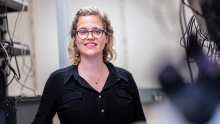Students from the University of British Columbia have won the 2009 ACM International Collegiate Programming Contest Pacific Northwest Regionals, beating out teams from Stanford and Berkeley for a chance to compete at the world finals this February.
Teams of UBC Computer Science students took first, tenth and fifteenth places respectively at the grueling five-hour programming contest hosted at UBC this Saturday. UBC students also won the regionals in 2003, 2004, 2005, 2006 and 2007, but were beat out by Stanford and Berkeley last year.
"The tenacity and talent of UBC's computer science students never ceases to impress me," said Prof. Bill Aiello, head of the Department of Computer Science. "This is the latest in a string of strong finishes in our region, and the entire department is extremely proud of all of our teams, coaches and advisors."
UBC, Stanford and Berkeley have been the dominant powers in the competition's Pacific Northwest region, winning all but two of the contests since 1994. This is the seventh consecutive year that a UBC team will advance to the ACM World Finals.
"This region is very big and very competitive," said Assoc. Prof. Will Evans, the teams' faculty advisor. "Stanford, Berkeley, SFU and Washington always field excellent teams."
The prestigious annual competition--headquartered at Baylor University and sponsored by IBM--gives teams five hours to solve between eight and 11 programming problems. Restricted to a single computer and a tight timeframe, teams must submit solutions as programs in C, C++ or Java. UBC's first place team of Cedric Lin, Simon Suyadi and Robert Tseng was the only team to complete ten of the 11 problems.
"The team did a great job--now we start preparing for the world finals," said UBC coach Anton Likhtarov, a Computer Science master's student and veteran of the 2007 and 2008 World Finals and 2009 Regional competition.
Directed from the University of Idaho, the Pacific Northwest region includes more than 80 institutions from Alaska, Hawaii, Washington, Oregon, northern and central California, western Nevada, and British Columbia.
UBC's top team will compete in the ACM International Collegiate Programming Contest World Finals in Harbin, China, in February, 2010.
The members of the UBC Computer Science teams are: Cedric Lin, Simon Suyadi, Robert Tseng, Jason Chang, Byron Knoll, Martin Lau, David Kurokawa, Kenneth Lui, and Sandy Robertson.
Musqueam First Nation land acknowledegement
We honour xwməθkwəy̓ əm (Musqueam) on whose ancestral, unceded territory UBC Vancouver is situated. UBC Science is committed to building meaningful relationships with Indigenous peoples so we can advance Reconciliation and ensure traditional ways of knowing enrich our teaching and research.
Learn more: Musqueam First Nation
Faculty of Science
Office of the Dean, Earth Sciences Building2178–2207 Main Mall
Vancouver, BC Canada
V6T 1Z4


